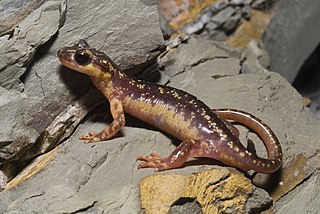
Lyciasalamandra is a genus of salamanders in the family Salamandridae. They are native to southwestern coast of Turkey and nearby Aegean Islands (Greece). As of early 2018, all species in the genus are threatened. The common name Lycian salamanders has been coined for them.
Lyciasalamandra atifi, or Atif's salamander, is a species of salamander in the family Salamandridae found only in Turkey. Its natural habitats are temperate forests and rocky areas. It is threatened by habitat loss.
Lyciasalamandra billae, the bay Lycian salamander, is a species of salamander in the family Salamandridae found only in Turkey. Its natural habitats are temperate forests and Mediterranean-type shrubby vegetation. It is threatened by habitat loss.
Lyciasalamandra fazilae, or Fazila's salamander, is a species of salamander in the family Salamandridae found only in Turkey. Its natural habitats are temperate forests and Mediterranean-type shrubby vegetation. It is threatened by habitat loss.

Lyciasalamandra helverseni, the Karpathos salamander, is a species of salamander in the family Salamandridae found only in Greece. Its natural habitats are Mediterranean-type shrubby vegetation and rocky areas.
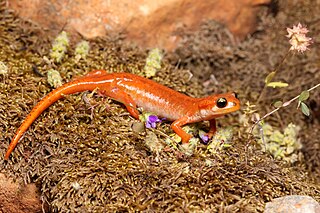
Luschan's salamander or Lycian salamander is a species of salamander in the family Salamandridae. It is found in the southwestern Anatolia in Turkey and adjacent Greece, in the island of Kastellorizo and its satellites.

The Persian brook salamander or Persian mountain salamander is an endemic amphibian species of salamander in the family Hynobiidae found in Iran and possibly Azerbaijan.
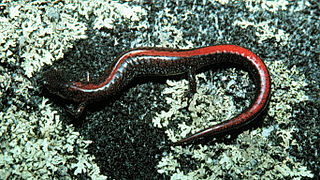
The Ozark zigzag salamander is a species of salamander in the family Plethodontidae endemic to the United States. It is one of 57 species in the genus Plethodon. Its natural habitats are temperate forests, freshwater springs, rocky areas, and caves. It is threatened by habitat loss.

The northern zigzag salamander is a species of salamander in the family Plethodontidae. It is endemic to the eastern United States and has been found in Illinois, Kentucky, Tennessee, Alabama, and Mississippi. The northern zigzag salamander's natural habitat includes temperate forests, rocky areas, and caves. It is threatened by habitat loss.
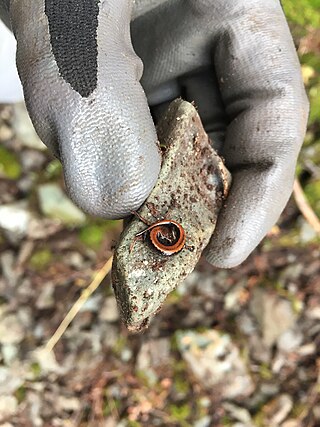
The Larch Mountain salamander is a species of salamander in the family Plethodontidae endemic to the United States. It occurs in the Cascade Mountains of southern Washington and northern Oregon. In Washington, it occurs from the Columbia River Gorge to just north of Snoqualmie Pass. Its natural habitats are temperate forests and rocky areas. It is threatened by habitat loss.

The Pigeon Mountain salamander is a species of salamander in the family Plethodontidae. It is endemic to Pigeon Mountain in the US state of Georgia.

The Big Levels salamander is a species of salamander in the family Plethodontidae. It is endemic to Virginia in the eastern United States. First described in 2004, it derives its specific name, sherando, from Sherando Lake in the George Washington National Forest. Its common name refers to the Big Levels area of southeastern Augusta County, Virginia, a series of flat to gently rolling mountain tops in the Blue Ridge Mountains, where it was found.

The western red-backed salamander is a species of salamander in the family Plethodontidae. The species is found in extreme southwestern Canada and the northwestern United States. The western red-backed salamander is found in temperate rainforests of the Pacific Northwest. It is considered widespread in the region and is not strictly associated with a specific habitat type.
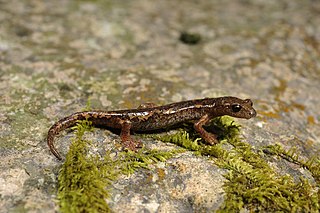
Ambrosi's cave salamander or the Spezia cave salamander is a species of salamander in the family Plethodontidae. Endemic to northwestern Italy, its natural habitats are temperate forests, rocky areas, caves, and subterranean habitats. It is threatened by habitat loss.

The Monte Albo cave salamander or Stefani's salamander is a species of salamander in the family Plethodontidae, endemic to Sardinia.
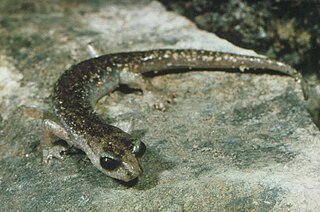
The brown cave salamander, also known as Gene's cave salamander, Sardinian cave salamander, or simply Sardinian salamander, is a species of salamander in the family Plethodontidae. It is endemic to Sardinia (Italy). Its natural habitats are temperate forests, rocky areas, caves, and subterranean habitats. It is threatened by habitat loss.

The Italian cave salamander is a species of salamander in the family Plethodontidae. Endemic to Italy, its natural habitats are temperate forests, rocky areas, caves, and subterranean habitats. It is threatened by habitat loss.

The Supramonte cave salamander is a species of salamander in the family Plethodontidae, endemic to the island of Sardinia (Italy).

There are 14 species of amphibians and 5 species of reptiles known to occur in Mount Rainier National Park.
















